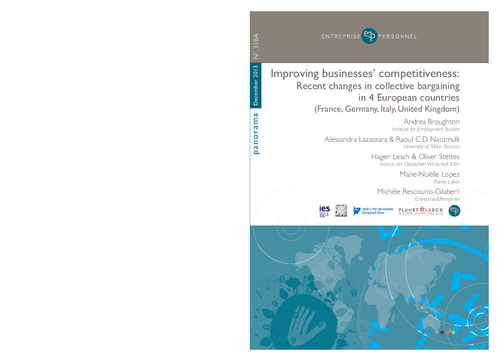Recent changes in collective bargaining in 4 European countries (France, Germany, Italy, United Kingdom)

Improving businesses’ competitiveness
Report

Recent changes in collective bargaining in 4 European countries (France, Germany, Italy, United Kingdom)
Today, the success of neighbouring countries’ social models is often referred to when one’s own country is stuck with a complicated reform. Governments and corporate managements also regularly mention the advantages of this model to suggest transposing it.
It’s the case in France for instance where, in some cases, the British social model is praised for its flexibility or, in other instances, the German model for its co-determination principle.
But is it possible to transpose something considered as a success in another country? Can an agreement signed in an Italian company become a reference for a German firm?
This study is trying to answer these difficult questions, mainly focusing on corporate case studies. We thought it would be interesting to focus on the levers used to look for competitiveness through collective bargaining in companies in 4 countries (France, Germany, Italy and United Kingdom).
What are the levers used? Are they the same everywhere? Can they really be transposed? Remember that each country has its own history, collective bargaining organization and stakeholders, and that all these elements build a special industrial relations model.
This was verified with the latest reforms encouraged by the European Commission these last two years. Reforms affecting pensions, unemployment insurance or the labour market were only possible via compromises reached in each country.
The last two Notes de conjoncture sociale done by Entreprise&Personnel focus on these reforms in the European Union. Some were done by the lawmaker and/or with the social partners.
However, before we start analysing company collective agreements on competitiveness (III), we will spend some time on the general principles of industrial relations in individual countries (I) and on recent collective bargaining changes (II). Such immersion is necessary to learn all the lessons.

Hagen Lesch / Oliver Stettes et al.: Improving businesses’ competitiveness – Recent changes in collective bargaining in 4 European countries (France, Germany, Italy, United Kingdom)
Report

More on the topic
![[Translate to English:] Das Gebäude des Weißen Hauses in Washington, D.C. in den Vereinigten Staaten von Amerika. [Translate to English:] Das Gebäude des Weißen Hauses in Washington, D.C. in den Vereinigten Staaten von Amerika.](/fileadmin/_processed_/c/1/csm_GettyImages-2161499385_White_House_Editorial_884306add8.jpg)
Trump or Harris or ...? What Europe must prepare for
A few months before the presidential election in the USA, Donald Trump has a good chance of being re-elected. On the Democratic side, the incumbent president has withdrawn his candidacy after a long period of hesitation, while Vice President Kamala Harris is ...
IW
Compendium 5.5: CO2 Regulation of Road Transport in Europe
With the Compendium CO2 Regulation in Europe, the IW has been providing the interested public with a comprehensive collection of data on the development of CO2 emissions from passenger car traffic in the European Union, as well as on the applicable regulatory ...
IW